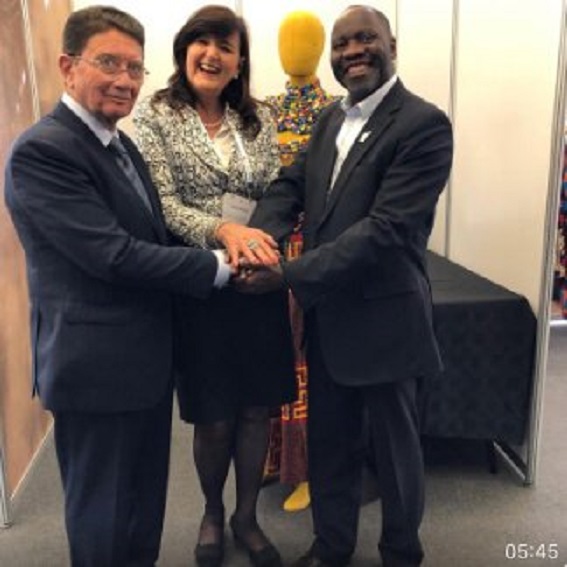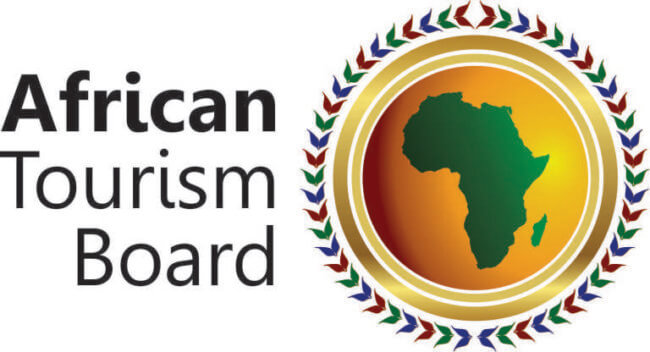Christmas is no longer only for Christians in Africa. Africa became one tourism destination for the world with the launch of the African Tourism Board.
Even in some of Africa’s predominantly Muslim countries, Christmas is still recognized as a secular celebration. In the West African nation of Senegal, Islam is the main religion; and yet Christmas is designated as a national holiday along with Easter, the end of Ramadan, and Prophet Mohammed’s birthday. Senegalese Muslims and Christians have chosen to unofficially celebrate each other’s holidays, laying the foundation for the country’s renowned atmosphere of religious tolerance.

The African Tourism Board WhatsApp group is reflecting a very good example of how tourism stakeholders from every corner in Africa are coming together for the Christmas Holiday.
Quoting the Tourism Nation Address ATB President Alain St.Ange received a “Thank you, Sir. In Ghana, we say “you Do All”.
St.Ange writes: Christmas is a time of joy, peace, and harmony. It is a time where we share the love and we forgive. A time when families and friends strengthen their bonds.
It is a time of sharing and giving. While some are cheering, some are weeping, others are struggling. Our thoughts this Christmas go out to those who are in need and are facing challenging times. As Christmas is a time when unity reigns, we pray that in our reflections for a better tomorrow, we think of the less fortunate ones.
May our reflections and actions help to give them hope of a brighter future, where they can also receive added joy and comfort during Christmas time. May we be guided towards creating new beginnings for not only ourselves but for our country, and especially the people who are struggling and striving for a better life.
During this time when families and friends unite and build stronger relations, let us support one another and remind each other that we need stronger families to build stronger communities and to become one Seychelles
The Official Dance my Masaka Kids Africana reflects the spirit African Tourism Board members are putting out during the ongoing holiday season.
African Tourism Board can be found in many countries.
ATB has an open invitation for the world to work together on the goal to make Africa one tourism destination of choice in the world.
or many people, Africa is synonymous with arid deserts and tropical jungles; hardly compatible with the northern hemisphere ideas of Christmas. And yet, Christmas is celebrated throughout the continent by Christian communities both large and small. Customs, traditions, and even the date of the holiday differ from country to country but the religious foundation of the celebration remains the same, unifying people from all walks of life and a myriad of different cultures.
How to Say Happy Christmas in Africa
In Akan (Ghana): Afishapa
In Shona (Zimbabwe): Muve neKisimusi
In Afrikaans (South Africa): Geseënde Kersfees
In Zulu (South Africa): Sinifisela Ukhisimusi Omuhle
In Swazi (Swaziland): Sinifisela Khisimusi Lomuhle
In Sotho (Lesotho): Matswalo a Morena a Mabotse
In Swahili (Tanzania, Kenya): Kuwa na Krismasi njema
In Amharic (Ethiopia): Melkam Yelidet Beaal
In Egyptian Arabic (Egypt): Colo sana wintom tiebeen
In Yoruba (Nigeria): E ku odun, e hu iye’ dun
Click on the country where you will find African Tourism Board members.
Have you joined ATB? Click here to to become a member of ATB.
- Australia
- Belgium
- Botswana
- Cameroon
- Canada
- Cape Verde
- Chad
- China
- Comoros
- Congo (Rep of the)
- Côte d’Ivoire
- Democratic Republic of Congo
- Djibouti
- Egypt
- Eswatini
- Ethiopia
- Germany
- Ghana
- HongKong
- India
- Indonesia
- Ireland
- Israel
- Italy
- Jamaica
- Jordan
- Kenya
- Lesotho
- Libya
- Madagascar
- Malawi
- Malaysia
- Malta
- Mauritius
- Mayotte
- Mexico
- Morocco
- Mozambique
- Namibia
- Netherlands
- New Zealand
- Nigeria
- Reunion (France)
- Rwanda
- Seychelles
- Sierra Leone
- South Africa
- Spain
- Sri Lanka
- St. Helena (UK)
- Sudan
- Switzerland
- Taiwan (ROC)
- Tanzania
- Turkey
- Uganda
- UK
- United Arab Emirates (UAE)
- USA
- Zambia
- Zimbabwe
Kenya
The tradition of having a Christmas tree is one of the customs that continue to be popular in Kenya. In Kenya, people use cypress trees as Christmas trees, and these are decorated for Christmas. In the streets, houses and churches are decorated with colorful balloons, ribbons, paper decorations, and sometimes flowers.
Christmas, families gather together, and the Kenyans who live in the cities travel back to the villages they came from to spend Christmas with their families. Christmas dinner is eaten with the family, and here they often have a barbecue-marinated goat, mutton, beef or chicken, which is eaten with chapati (flatbread).
Another common custom is to participate in a midnight mass on 24 December, where psalms are sung and Kenyans wish their friends and families “heri ya Krismasi”, which means Merry Christmas in Swahili.
Uganda
Christmas in Uganda is hard to notice in most of the country. The place you might most clearly see that it is Christmas is in the capital of Uganda, Kampala, where some of the city’s streets are decorated with lights.
For many in Uganda, it is unusual to give each other gifts for Christmas, But if they do give gifts, they are typically edible ones, such as meat, sugar or something the family has grown themselves in their own fields.
Leading up to Christmas, families eat delicious meals that are different from what they usually eat. In rural areas, the diet consists primarily of beans and bananas or grains the family has grown in their fields. For Christmas, the meal consists of things such as ox meat or chicken with potatoes or rice.
Other than the Christmas dinner, many also go to church on 24 December. It is common to wear your finest attire to church, and women are dressed in colorful traditional dresses with matching turbans.
South Africa
British traditions have also influenced several South African Christmas traditions.
For example, South Africans exchange gifts in the morning on 25 December, after which the big Christmas dinner is eaten. Christmas dinner is often eaten outdoors on porches or in gardens, as it is summer in South Africa in the Christmas month. The feast is very relaxed, and so friends – and even strangers – are sometimes invited along for this meal.
There are no fixed traditions for what the Christmas dinner should consist of, so South African families eat many different things. Some typical Christmas dishes include glazed ham and turkey steak, while others eat shellfish as a starter.
One popular way to spend Christmas Eve is to take part in a “carols by candlelight” event, where
South Africans gather in groups to sing Christmas psalms. Some places have orchestras and choirs, and you can come to hear them sing at Christmas.
Botswana
In Botswana, people decorate their homes in the holiday season much as people do in the UK.
Christmas Eve is spent with family, and they sing Christmas psalms. In the morning on 25 December, the whole family exchanges gifts, just like the tradition in England. A large segment of the population in Botswana lives in poverty, and so the gifts are often home-made.
After the gift exchange, the family eats Christmas dinner together, and the meal typically includes the Botswanan national dish, seswaa. Seswaa is a stew consisting of ox or goat meat served with maize meal. The meat that is served is often an animal from the family’s farm, which they slaughter leading up to Christmas.
Those who love festivities in the holidays will sometimes hold a Christmas party, which lasts for several days.
Tanzania
In Tanzania, Christmas is celebrated on 25 December. The celebration starts when Christian Tanzanians go to the Christmas mass, after which they enjoy a Christmas dinner.
Christmas dinner often consists of ugali, which is a kind of maize meal, and if they can afford it, chicken or fish are served as well. Aside from this, they eat “pilau”, which is a spiced rice dish, which can be served with meat or shellfish.
After the Christmas dinner, some families also exchange gifts, which are often home-made.
The place you most clearly notice that it is Christmas is in Dar es Salaam, which is Tanzania’s biggest city. Here the shopping centers are decorated with lights, and some places also have Christmas trees set up.
The Catholic churches of the city are also decorated for Christmas with wax candles and flowers, and on Christmas Eve, the church holds a midnight mass.
Namibia
Christmas in Namibia starts with Christmas lights switching on in the big cities of the country around 6 December. Many families take their children around the city to look at the Christmas lights that illuminate the streets and fill them with a Christmas mood.
Some places in Namibia, such as inner Namibia, wax candles are not used, as the summer heat causes the wax to melt. Instead, they use electric lights.
In some shops, you can find German cookies leading up to Christmas. This “tradition” stems from the time Namibia was colonised by the Germans between 1884 and 1915.
A unique custom leading up to Christmas is to decorate a thorny branch with red and green Christmas decorations and hang it up at home.
The country has many different peoples, and they also have different Christmas traditions. In the Zambezi region, it starts on 24 December with a Christmas mass.
In some of the German communities in Namibia, families import Christmas trees from South Africa. Many others decorate thorn bushes instead.
GOT NEWS? click here
Google News, Bing News, Yahoo News, 200+ publications
The Herero people have a tradition where children prepare a small Christmas play leading up to the holiday, which they show their parents on Christmas Day. Afterward, the family gathers for Christmas dinner.
Egypt
Egyptian Orthodox Christians or Coptic Christians celebrate Christmas on the 7th of January. According to their calendar, it is the 29th day of the Coptic month of “Kiohk” or “Khiahk”. They fast 43 days before Christmas. This is called “Lent fasting”. During this period they do not eat meat, fish, milk and eggs.
After church service people return to their home and have a special meal called “fatta” The meal usually contains meat and rice. On Christmas day families visit their friends and neighbors.
Ethiopia
Like in Egypt, most Ethiopian people follow the ancient Julian calendar and celebrate Christmas on January 7th . Traditionally referred to as Ganna, an Ethiopian Christmas typically begins with a day of fasting followed by church services and feast that includes stew, vegetables and sourdough bread. At dawn of Ganna people traditionally wear white cotton clothes called “Shamma” with colorful stripes at its ends. Though most friends and families do not exchange gifts, communities gather to play games and sports, and enjoy the festivities together.
Ghana
Christmas in Ghana coincides with the end of the cocoa harvest and begins on December 1st , four weeks before Christmas. Due to the cocoa harvest, it is a time of wealth. Everyone returns home from wherever they might be such as farms or mines. Families decorate their homes and neighborhoods just like in the US, using lights, candles and ornaments. On Christmas day, things really kick into full swing, starting with a family meal – usually consisting of goat, vegetables and soup or stew with fufu – followed by a church service which includes lots of dancing and a nativity play for the whole community and a colorful holiday parade.
A special and unique Christmas tradition in Ghana is the honoring of midwives, based on a local legend about Anna, who is said to have assisted in the birth of Jesus Christ in Bethlehem and saved his life from a jealous Judean king. Anna’s story is told every Christmas in Ghana.
Ivory Coast
In Cote d’Ivoire Christmas celebrations mostly focus on the religious aspects of the holiday. The commercialization is often absent. Midnight mass is central to the Christmas celebration.
In Abidjan, Christmas is mostly a time when Ivorian youth indulge in partying and dancing at bars without roofs called “maquis”.
On the 25th and on January 1st, families gather at the home of an elder to eat and drink.
Benin
Religious sermons dominate Christmas celebrations in Benin. Some villages include dancing and masquerade parties.
Over 40% of the people in Togo are Christians. French Christmas traditions are common. Unlike most other West African countries, Santa Claus and Christmas trees have become part of the tradition. Only the Christmas dishes remain Togolese.
Burkina Faso
In many Burkina Faso villages, children mix clay, straw and water to build masterpieces outside their compounds, illustrating the biblical theme of the crib. The nativity scenes are highlights in the villages and stand until the rain washes them away, often close to Easter.
Sierra Leone
In Sierra Leone, celebrations are lively and partying is mixed with ancient traditions. Pre Christianity traditions and popular costumes have been mixed with religious sermons, making the Sierra Leonean Christmas a unique celebration. Spectacular and ancient masquerades and masking ceremonies now play a major part in the festivities in Freetown.
Christmas day is a time for family and friends. Excellent dishes are prepared and presents are exchanged. Even the country’s Muslim president once noted that Christmas is a time for giving and sharing with others whatever little one has.
Liberia
Instead of Santa Claus, In Liberia you are more likely to see Old man Bayka, the country devil who – instead of giving presents, walks up and down the street begging for them on Christmas Day. And instead of hearing the usual “Merry Christmas” greeting, expect to hear Liberians say “My Christmas on you” It’s basically a saying that means “please give me something nice for Christmas” Cotton cloth, soap, sweets, pencils and books are the popular Christmas presents, which are exchanged amongst people. A church service is held in the morning . The festive dinner, consisting of a meal of rice, beef and biscuits, is eaten in the outdoors. Games are played in the afternoon and at night fireworks light up the sky .
The Democratic Republic of Congo
Christmas Eve is very important in the democratic republic of Congo. Churches host big musical evenings (many churches have at least five or six choirs) and a nativity play. These plays last a very long time, starting at the beginning of the evening with the creation and the Garden of Eden.
On Christmas day, most families try to have a better meal than usual. If they can afford it they will have some meat (normally chicken or pork).
Nigeria
One of the most popular Christmas traditions in Nigeria is the decorating of homes and churches with palm fronds. According to an old belief, palm fronds symbolize peace and harmony during the Christmas season. Apart from Christmas carols and midnight mass, people in Nigeria have the traditional “Ekon” play. Groups performing this play, dance from home to home carrying a baby. The baby symbolizes the birth of Jesus Christ. Homeowners accept the doll and give presents to the group. Then the doll is returned to the group which continues their “journey”
Senegal
In the West African nation of Senegal, where 95% of its population is Muslim, Islam is the main religion, and yet Christmas is a national holiday. Senegalese Muslims and Christians have chosen to celebrate each others holidays, laying the foundation for the county’s enviable atmosphere of religious tolerance.
Guinea
In Guinea, Christians are also strongly outnumbered. Mostly French religious Christmas traditions have been adopted, including Midnight mass, eating local dishes together with family and exchanging gifts.
Guinea Bissau
In the former Portuguese colony of Guinea Bissau, local Christmas traditions have had time to evolve. In Bissau there is no Christmas eve without “Bacalao”, a plate of dried cod imported all the way from Scandinavia. Prices on the fish skyrocket in Bissau markets before Christmas.
Unlike most other Catholic-dominated West African countries, the 24th of December is when the great family celebrations occur in Guinea Bissau. Clothes are typically given on the 25th. Bissau citizens proudly wear their new clothes on the way to parties. The midnight mass and street parties on the 25th is a time when all citizens participate. Even some of the Muslim majority joins in the street parties, as there is no history of religious tension.
Malawi
In Malawi, groups of children go door to door to perform dances and Christmas songs dressed in skirts, made from leaves and using homemade instruments. They receive a small gift of money in return.
Zimbabwe
In Zimbabwe, it is a tradition for children to bring little presents to children who are in the hospital or for any reason can’t attend church services. On Christmas day people parade with large intricately made lanterns called “Fanals” in the shape of boats or houses and several families in the neighborhood often party together. Adults have a party in one house and children enjoy themselves in another
Madagascar
In Madagascar, Christmas is the time of mass baptism of children. There is also a tradition of visiting elders and other highly respected people in the community
Seychelles
Xmas in Seychelles is all about food, family and beach time. The family would attend Christmas midnight mass at Anse Royale and then try to get some rest before waking again to much excitement of opening presents on Christmas day and then the mad dash to get to the beach to test them out. Spending Christmas in Seychelles means quality family time and rest. Christmas time in Seychelles is the time for sumptuous banquets and family meetings. During this festive season, every family member usually hosts a lavish dinner which is then followed by gift-giving and evening parties.
Eswatini (former Swaziland) sums it all up:
In Swaziland Christmas is not consumer/revenue driven; in Swaziland Christmas is truly about Christ and about celebrating His birth, about family and about being together. It is not about the gifts and everything else that goes with it. It is plain and simple, it is beautiful and it is full of joy.
MEDIA CONTACT: TravelMarketingNetwork, 954 Lexington Ave. #1037, New York, NY 10021 USA, PH: (+1) 718-374-6816, marketing@travelmarketingnetwork.com








